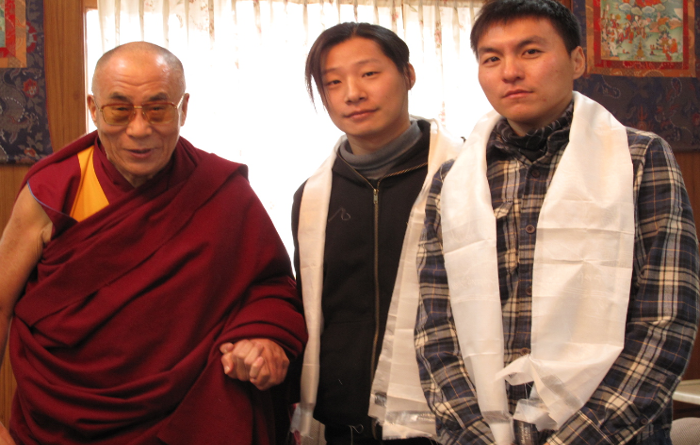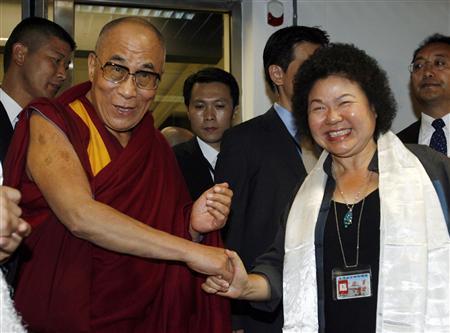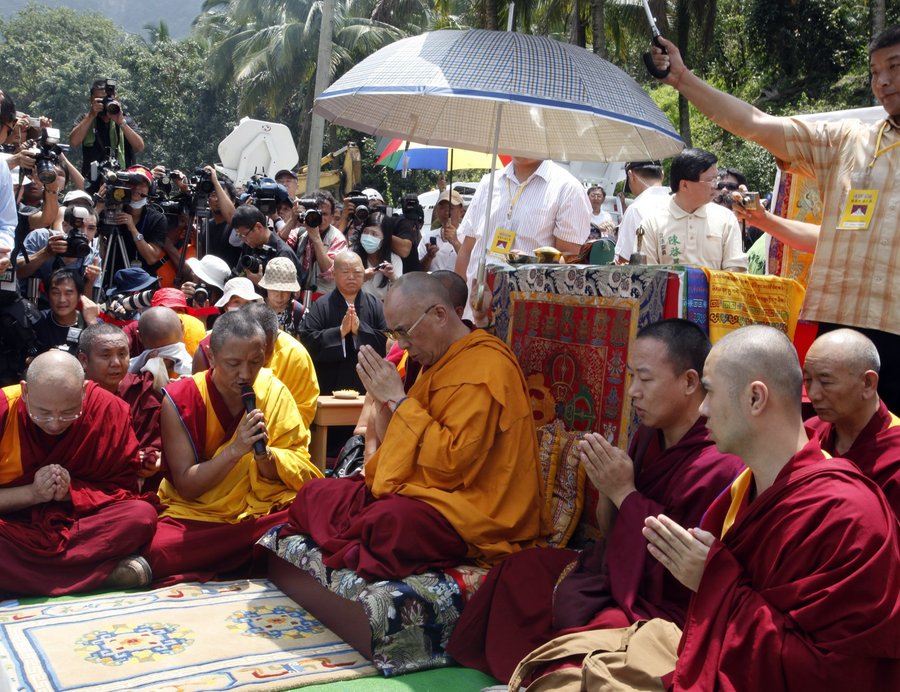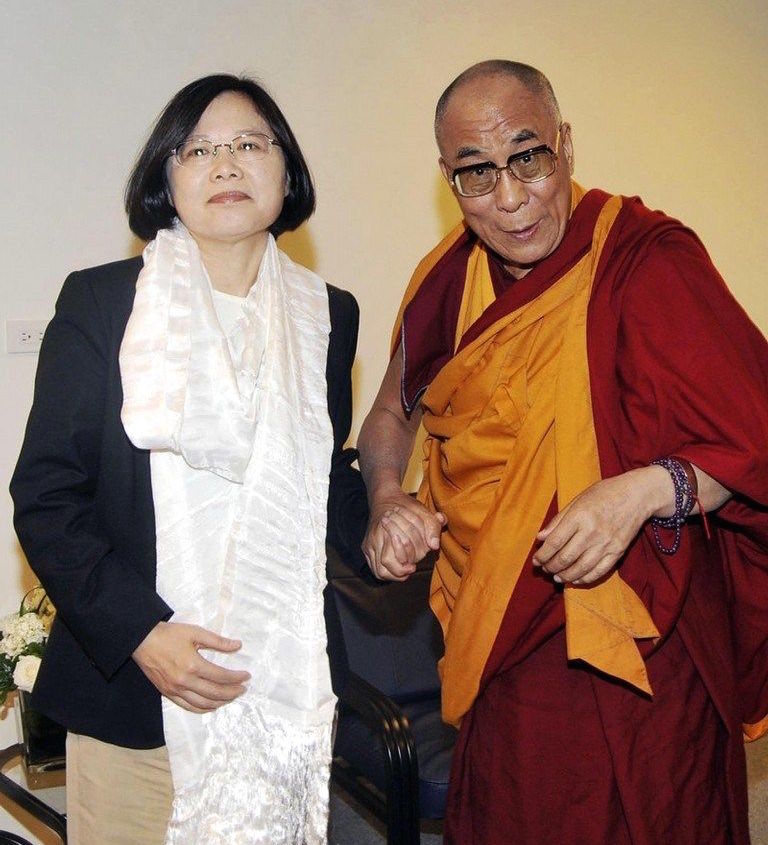by Brian Hioe
語言:
English
Photo Credit: Freddy Lim
A VISIT BY New Power Party legislator and metal musician Freddy Lim to the Tibetan government-in-exile in Dharamsala, India took place recently, with a meeting taking place between Lim and the Dalai Lama. Indigenous legislator Kolas Yotaka also met with the Dalai Lama, with the Dalai Lama expressing approval of Tsai’s apology to indigenous and expressing a desire to visit Taiwan again. This has raised questions of whether Taiwan would be open to a visit by the Dalai Lama.
The Dalai Lama visited Taiwan in 1997, 2001, and 2009. Thereafter, the Dalai Lama was rejected for visa entry to visit Taiwan as efforts to build ties with China ramped up under the Ma administration. An application for a planned 2012 visit was rejected, presumably out of fear of offending China. Nevertheless, it was the case that some members of the KMT, such as Apollo Chen, called for Ma to allow the Dalai Lama to visit again before the end of Ma’s term.
Lim has long been a supporter of the Dalai Lama and the cause of Tibetans. This would not be the first time Lim has met the Dalai Lama, having previously met with the religious leader in 2008. Metal band Chthonic, of which Lim is the frontman of, had previously organized Free Tibet concerts in 2003 and 2009. Lim has also invited the Dalai Lama to visit Taiwan in the past and frequently expresses admiration for the Dalai Lama, featuring a large mural of him in his New Power Party office. A Tibetan representative was also present at the opening of the New Power Party office.
 An earlier meeting between Lim and the Dalai Lama in 2009. Photo credit: Freddy Lim
An earlier meeting between Lim and the Dalai Lama in 2009. Photo credit: Freddy Lim
Support of Tibet would presumably go hand-in-hand with Lim and Chthonic’s vocal support for Taiwanese independence. But of Taiwanese musicians emphatic on Taiwanese identity, it would not only be Chthonic which has met with the Dalai Lama, rapper Dwagie having released a track featuring vocals from the Dalai Lama and having also been a collaborator with Chthonic for past musical endeavors.
Legislative speaker Su Jia-chyuan stated that Taiwan would welcome a visit any individuals who are in favor of democracy and freedom in response to reports that the Dalai Lama would be interested in visiting Taiwan again. It is probable that a visit by the Dalai Lama would lead to anger from China and so with recent tensions, one wonders whether the Tsai administration would view it politically expedient at this time for the Dalai Lama to visit Taiwan.
There were rumors in 2015 of a secret invitation by Tsai for the Dalai Lama to visit Taiwan. But with the issue having been flagged by Lim, if the Tsai administration were to refuse the Dalai Lama entry to Taiwan, this would lead to blowback against Tsai for not acting any different than the Ma administration before it—even regarding an individual as popularly revered as a figure of peace across the world as the Dalai Lama. Alternatively, the Tsai administration could leverage upon Chinese anger regarding a visit by the Dalai Lama as a soft power initiative against China, which might make allowing the Dalai Lama to visit Taiwan a good move for the Tsai administration.
 A meeting between Kaohsiung mayor Chen Chu and the Dalai Lama during the Dalai Lama’s visit to Taiwan in 2009. Photo credit: Reuters/Nicky Loh
A meeting between Kaohsiung mayor Chen Chu and the Dalai Lama during the Dalai Lama’s visit to Taiwan in 2009. Photo credit: Reuters/Nicky Loh
Yet, ironically, it actually is that the ROC framework which Tsai Ing-Wen is not willing to break away from, which retains claims over Tibet, Mongolia, Xinjiang and other regions; the territorial claims of the ROC are actually larger than those of present-day China. The ROC government maintains a Mongolian and Tibetan Affairs Commission as part of this, seeing as the ROC framework retains the claim that it is a government-in-exile from China and the rightful ruler of China as such. Tsai does not seem willing to break from the ROC framework for the time being, for fear of being thought of as a dangerous provocateur of cross-strait relations determined to realize Taiwanese independence.
The Tsai administration has proposed to abolish the Mongolian and Tibetan Affairs Commission, a move the Dalai Lama praised during his meeting with Lim. But the Tsai administration faces possible attacks from the KMT and others if it were to move forward with this plan. Though a potential Dalai Lama visit flags the issue, with increasing conservatism by the Tsai administration regarding the ROC framework, in the event of a Dalai Lama visit Tsai would quite possibly sidestep the issue altogether and hew towards generalities about democratic freedom in Taiwan and the world. The Mongolian and Tibetan Affairs Commission, a ministry-level department despite its apparent uselessness, is currently headed by Lin Mei-chu, who is also Tsai’s cousin. Lin has proposed not abolishing the Mongolian and Tibetan Affairs Commission altogether but rather folding it into government departments as the Mainland Affairs Council, which handles relations with China.
Nevertheless, one might also raise another issue, which is that Taiwanese supporters of Tibet, whose support for Tibet goes hand-in-hand with pro-Taiwan views, generally do not consider that the Dalai Lama is the leader of a government-in-exile from Tibet which has been estranged from Tibet for close to sixty years. If one does not maintain that the KMT and the ROC is the rightful government-in-exile of China, the ROC having been displaced from China for close to seventy years, is it logical to support the Tibetan government-in-exile as the rightful government of Tibet after sixty years in exile?
 The Dalai Lama praying for victims of Typhoon Morakot in Pingtung during his 2009 visit to Taiwan. Photo credit: Reuters
The Dalai Lama praying for victims of Typhoon Morakot in Pingtung during his 2009 visit to Taiwan. Photo credit: Reuters
Notably, in recent years, there are increasing tensions between Tibetans in Tibet and the Tibetan exile community, with Tibetans in Tibet taking the view that the Tibetan exile community does not represent them and cannot speak for their interests. This is hardly a case of Tibetans in Tibet under Chinese control being brainwashed by China, or anything of that sort, but rather it speaks to a generational separation.
Obviously many Tibetans today chafe under Chinese rule, as is seen most dramatically in incidents of self-immolation, which sometimes occur in waves. But Tibetans who were born in India and have spent most, or even all of their lives, in India and differ substantially in background and life experiences from Tibetans living in Tibet today. For example, members of the Tibetan exile community in India or elsewhere rarely speak Mandarin fluently, whereas many younger Tibetans in Tibet who have grown up under Chinese rule do—a prominent sign of the generational differences between both Tibetan groups. The heavy emphasis of Tibetan exile groups on reverence of the Dalai Lama would another dividing line. Though this is a controversial issue within Tibetan communities, Tibetan groups in Taiwan—almost all from the Tibetan exile community—do in fact often assert that they can speak for Tibetans in Tibet living under Chinese control, without any sense of distance or mediation, and this is usually unquestioned by their Taiwanese supporters.
 An earlier meeting between Tsai Ing-Wen and the Dalai Lama. Photo credit: Wakan Films
An earlier meeting between Tsai Ing-Wen and the Dalai Lama. Photo credit: Wakan Films
Likewise, the Dalai Lama was originally not only Tibet’s religious leader, but also its political one, with “theocracy” being a word often used to describe pre-PRC Tibet, which is not necessarily off mark. This dimension of the Tibet is in most cases totally unknown to Taiwanese concerned with Tibetan issues. As a result of such controversy, however, the current Dalai Lama, Tenzin Gyatso, has stepped down from any political positions, backed away from advocating Tibetan independence and instead called for Tibetan “autonomy” from China which is not necessarily independence—as well as suggested that he will have no successors for the position of Dalai Lama after his death.
A visit by the Dalai Lama would be an occasion to raise Taiwan’s international profile, particularly where greater respect for human rights is one aspect of Taiwan which differentiates it from China. But there are also challenges to be addressed in the event of a visit by the Dalai Lama and these are some of them.

